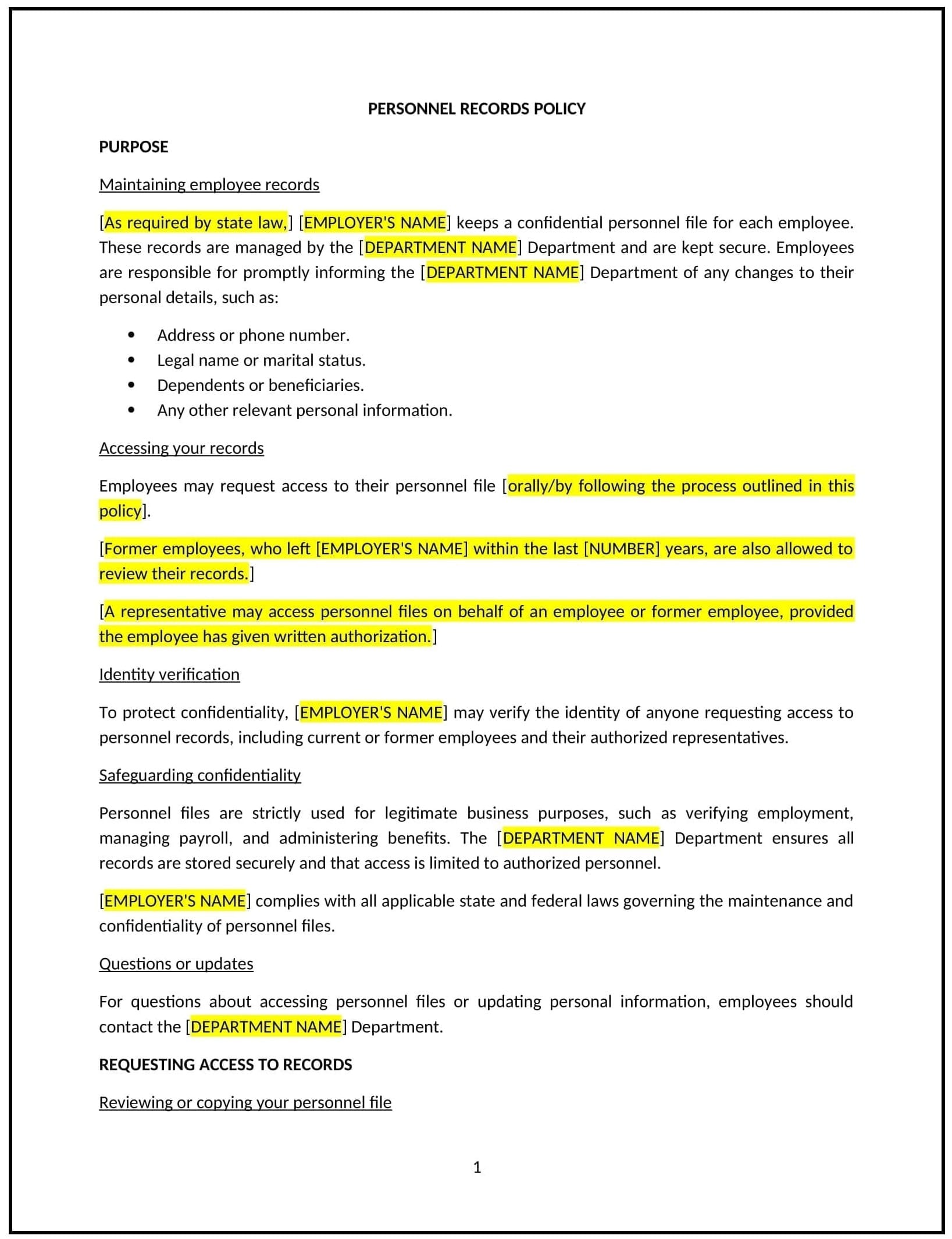Got contracts to review? While you're here for policies, let Cobrief make contract review effortless—start your free review now.

Customize this template for free
Personnel records policy (Texas)
This personnel records policy is designed to help Texas businesses establish clear guidelines for the creation, maintenance, and protection of employee records. The policy outlines the types of records that will be kept, how they will be stored, who will have access to them, and how long they will be retained. It also covers employee rights regarding access to their records, improving the company’s compliance with Texas state laws and federal regulations related to privacy and recordkeeping.
By adopting this policy, businesses can ensure proper management of employee records, protect confidential information, and foster a transparent and compliant work environment.
How to use this personnel records policy (Texas)
- Define the types of records: Specify the types of personnel records that will be maintained, including personal details (name, address, emergency contacts), employment history (job title, dates of employment), performance evaluations, disciplinary actions, and compensation records.
- Set retention periods: Establish clear guidelines for how long different types of records will be retained. This should align with Texas state laws and federal regulations regarding record retention. After the retention period, records should be securely disposed of or archived.
- Outline record storage and access: Specify how employee records will be stored (e.g., electronic or paper records) and who will have access to them. Access should be restricted to authorized personnel, such as HR staff or managers, and granted based on business needs.
- Address confidentiality: Ensure that personnel records are kept confidential and are protected from unauthorized access, theft, or loss. The policy should specify who is responsible for maintaining confidentiality and how access is controlled.
- Set employee rights regarding access: Specify how employees can request access to their own personnel records. This should include the process for making requests, the timeframe for providing access, and any exceptions to this access.
- Ensure compliance with legal requirements: The policy should help ensure that personnel records are maintained in compliance with relevant Texas state laws, federal regulations (such as the Fair Labor Standards Act or the Family and Medical Leave Act), and industry best practices.
- Outline procedures for record corrections: Provide a clear process for employees to request corrections to inaccurate or incomplete records. The policy should specify how corrections will be made and how disputes regarding the records will be handled.
Benefits of using this personnel records policy (Texas)
This policy offers several benefits for Texas businesses:
- Enhances compliance: By adhering to recordkeeping requirements under Texas state laws and federal regulations, businesses can mitigate the risk of legal penalties and protect themselves from potential claims related to record management.
- Protects employee privacy: By safeguarding personnel records and limiting access to authorized individuals, businesses can maintain employee trust and prevent unauthorized disclosures of sensitive information.
- Promotes transparency: By outlining employee rights to access their records, businesses promote transparency and ensure that employees feel empowered to review their personal information.
- Improves organizational efficiency: A structured process for managing personnel records helps streamline HR operations, making it easier to find and update records, track compliance, and generate reports.
- Reduces risks of litigation: Properly maintained records, with clear access and correction procedures, reduce the risk of legal disputes related to employee performance, compensation, or disciplinary actions.
Tips for using this personnel records policy (Texas)
- Communicate the policy clearly: Ensure all employees are aware of how their personnel records will be maintained and their rights regarding access and correction. This can be included in the employee handbook or discussed during onboarding.
- Monitor access to records: Ensure that only authorized personnel have access to employee records, and regularly review who has access to maintain confidentiality and protect against unauthorized use.
- Regularly review records retention schedules: Periodically review the company’s records retention policies to ensure they comply with current Texas state laws, federal regulations, and business needs.
- Train HR personnel: Ensure that HR staff are trained on how to properly manage and protect employee records, including how to handle requests for record access, corrections, and storage.
- Document any changes: Keep accurate records of when employee records are created, modified, or accessed, to ensure that there is a complete audit trail.